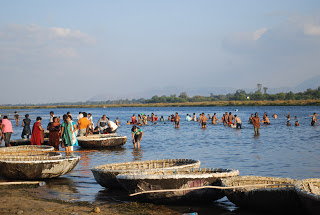Shivanasamundram, Karnataka
Shivasamudra is a small city in the Mandya District of the state of Karnataka, India. It is situated on the banks of the river Kaveri, which forms here the boundary to the Chamarajanagar District, and is the location of one of the first Hydro-electric Power stations in Asia, which was set up in the year 1902
The Sivanasamudram Falls is on the Kaveri River after the river has wound its way through the rocks and ravines of the Deccan Plateau and drops off to form waterfalls. The island town of Shivanasamudra divides the river into twin waterfalls. This creates the fourth largest island in the rivers course. A group of ancient temples are located here and there likely was a village.
This is a segmented waterfall. Segmented waterfalls occur where the water flow is broken into two or more channels before dropping over a cliff, resulting in multiple side by side waterfalls. It has an average width of 305 meters, a height of 98 m, and an average volume of 934 cubic meters / sec. The maximum recorded volume is 18,887 cubic meters / sec. It is a perennial waterfall. The time of best flow are the monsoon season of July to October.
A common misconception about these waterfalls are that the left segment is called Gaganachukki and the right segment is called Bharachukki. In reality the Bharachukki falls are a few kilometers to the south-west of the Gaganachukki falls This is due to the Kaveri river itself splitting a few kilometers to the south into western and eastern branches The western branch results in the twin waterfalls of Gaganachukki, whereas the eastern branch results in the Bharachukki falls. The Gaganachukki waterfalls are best viewed from the Shivanasamudra watch tower Most of the pictures showing the twin waterfalls are taken from that location. There is another approach to the Gaganachukki falls from the Darga Hazrath Mardane Gaib (Imam Ali) . Despite warnings being posted, people climb down the rocks and attempt to view the waterfalls from behind/top, resulting in many fatal accidents. It is 139 km from the city of Bangalore.
Asia's First hydro-electric power station is located at the waterfall and is still functional. This station was commissioned by the Diwan of Mysore, Sir K. Seshadri Iyer. The power generated here was initially used in Kolar Gold Fields
.






